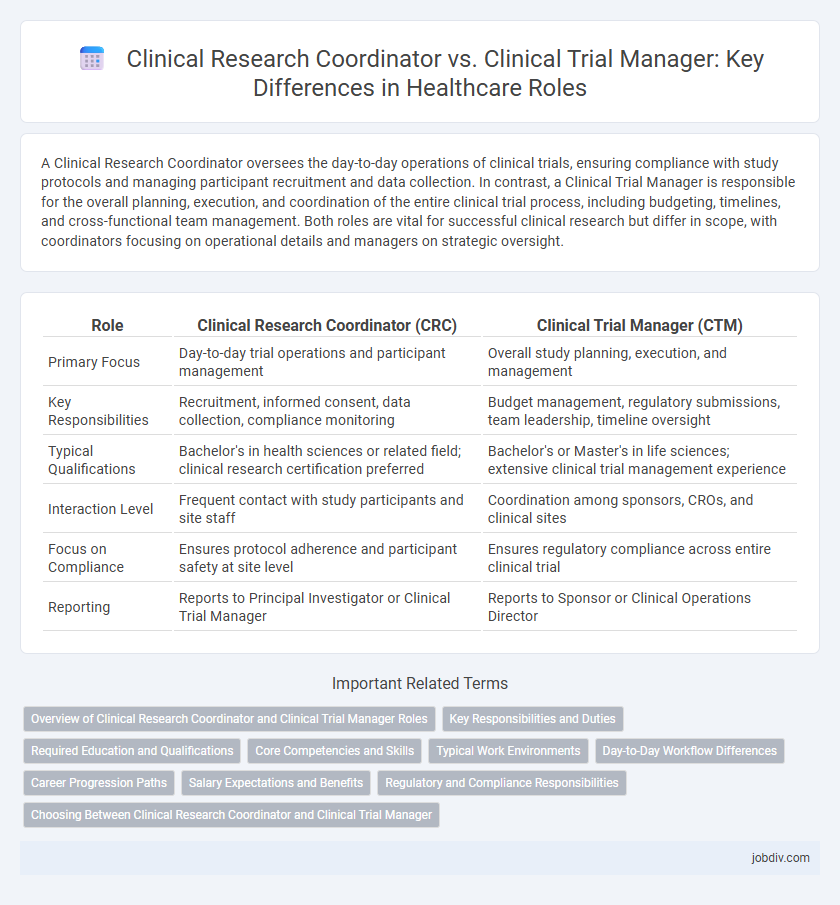A Clinical Research Coordinator oversees the day-to-day operations of clinical trials, ensuring compliance with study protocols and managing participant recruitment and data collection. In contrast, a Clinical Trial Manager is responsible for the overall planning, execution, and coordination of the entire clinical trial process, including budgeting, timelines, and cross-functional team management. Both roles are vital for successful clinical research but differ in scope, with coordinators focusing on operational details and managers on strategic oversight.
Table of Comparison
| Role | Clinical Research Coordinator (CRC) | Clinical Trial Manager (CTM) |
|---|---|---|
| Primary Focus | Day-to-day trial operations and participant management | Overall study planning, execution, and management |
| Key Responsibilities | Recruitment, informed consent, data collection, compliance monitoring | Budget management, regulatory submissions, team leadership, timeline oversight |
| Typical Qualifications | Bachelor's in health sciences or related field; clinical research certification preferred | Bachelor's or Master's in life sciences; extensive clinical trial management experience |
| Interaction Level | Frequent contact with study participants and site staff | Coordination among sponsors, CROs, and clinical sites |
| Focus on Compliance | Ensures protocol adherence and participant safety at site level | Ensures regulatory compliance across entire clinical trial |
| Reporting | Reports to Principal Investigator or Clinical Trial Manager | Reports to Sponsor or Clinical Operations Director |
Overview of Clinical Research Coordinator and Clinical Trial Manager Roles
Clinical Research Coordinators (CRCs) manage day-to-day clinical trial activities, including patient recruitment, data collection, and protocol compliance, ensuring seamless trial execution at the site level. Clinical Trial Managers (CTMs) oversee the entire clinical trial process, coordinating multiple sites, managing budgets, timelines, and regulatory submissions to ensure trial milestones are met. Both roles are essential in clinical research, with CRCs focusing on operational tasks and CTMs handling strategic management and trial oversight.
Key Responsibilities and Duties
Clinical Research Coordinators (CRCs) primarily handle the day-to-day management of clinical trials, including patient recruitment, data collection, and ensuring compliance with study protocols. Clinical Trial Managers (CTMs) oversee the overall trial operations, managing budgets, timelines, regulatory submissions, and coordination between multiple study sites. Both roles require expertise in Good Clinical Practice (GCP) standards but differ in scope, with CRCs focusing on execution and CTMs on strategic planning and trial oversight.
Required Education and Qualifications
Clinical Research Coordinators typically require a bachelor's degree in life sciences, nursing, or a related field, alongside certifications such as Certified Clinical Research Coordinator (CCRC) for enhanced job prospects. Clinical Trial Managers often hold advanced degrees like a master's or PhD in clinical research, public health, or biomedical sciences, with extensive experience managing clinical trials and knowledge of regulatory compliance. Both roles demand strong understanding of Good Clinical Practice (GCP) guidelines, but Clinical Trial Managers require a deeper expertise in project management and leadership skills.
Core Competencies and Skills
Clinical Research Coordinators excel in patient recruitment, informed consent processes, and data collection, ensuring compliance with study protocols and regulatory requirements. Clinical Trial Managers possess advanced skills in project management, budgeting, and cross-functional team leadership to oversee trial progress from initiation to close-out. Both roles require strong knowledge of Good Clinical Practice (GCP), regulatory guidelines, and excellent communication skills to facilitate coordination between stakeholders.
Typical Work Environments
Clinical Research Coordinators typically work within hospital research units, academic medical centers, or dedicated clinical research organizations, managing participant recruitment and data collection on-site. Clinical Trial Managers often operate in pharmaceutical companies, contract research organizations (CROs), or biotech firms, overseeing multiple trial sites and regulatory compliance remotely or through frequent site visits. Both roles require collaboration with regulatory bodies, clinical staff, and sponsors to ensure trial integrity and adherence to protocols.
Day-to-Day Workflow Differences
Clinical Research Coordinators primarily manage participant recruitment, informed consent, and data collection, ensuring protocol compliance during day-to-day trial operations. Clinical Trial Managers focus on overseeing the overall study progress, budgeting, site management, and coordinating multiple trials simultaneously. While coordinators handle on-site tasks and direct interaction with trial subjects, managers strategize study timelines and resource allocation to meet regulatory and sponsor requirements.
Career Progression Paths
Clinical Research Coordinators (CRCs) often begin their careers managing day-to-day trial activities, ensuring protocol compliance and patient coordination. As they gain experience and leadership skills, they can progress to Clinical Trial Manager roles, overseeing multiple studies, budgets, and cross-functional teams. This career path offers increased responsibilities in strategic planning, regulatory oversight, and resource management within clinical research.
Salary Expectations and Benefits
Clinical Research Coordinators typically earn between $50,000 and $70,000 annually, with benefits often including health insurance, paid time off, and professional development opportunities. Clinical Trial Managers command higher salaries ranging from $80,000 to $120,000, reflecting greater responsibility for trial oversight and team leadership, along with enhanced benefits such as performance bonuses and comprehensive health plans. Salary expectations vary based on experience, geographic location, and the complexity of clinical trials managed.
Regulatory and Compliance Responsibilities
Clinical Research Coordinators primarily handle regulatory submissions, informed consent processes, and ensure adherence to protocols during patient interactions, maintaining compliance with Good Clinical Practice (GCP) guidelines. Clinical Trial Managers oversee regulatory strategy implementation, monitor compliance across multiple trial sites, and manage audit readiness in accordance with FDA and ICH regulations. Both roles require in-depth knowledge of regulatory frameworks but differ in scope, with coordinators focusing on site-level compliance and managers on overarching regulatory governance.
Choosing Between Clinical Research Coordinator and Clinical Trial Manager
Choosing between a Clinical Research Coordinator and a Clinical Trial Manager depends on career goals and project responsibilities; Coordinators focus on participant recruitment, data collection, and compliance at the site level, while Trial Managers oversee multiple clinical sites, budgeting, and regulatory adherence throughout the study lifecycle. Clinical Research Coordinators often require strong interpersonal skills and attention to detail in managing day-to-day trial activities, whereas Clinical Trial Managers need strategic planning abilities and leadership experience to ensure overall trial success. Understanding these role differences optimizes staffing decisions in clinical research operations and enhances trial efficiency.
Clinical Research Coordinator vs Clinical Trial Manager Infographic

 jobdiv.com
jobdiv.com